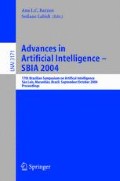Abstract
The general purpose of this paper is to show a practical instance of how philosophy can benefit from some ideas, methods and techniques developed in the field of Artificial Intelligence (AI). It has to do with some recent claims [4] that some of the most traditional philosophical problems have been raised and, in some sense, solved by AI researchers. The philosophical problem we will deal with here is the representation of non-deductive intra-theoretic scientific inferences. We start by showing the flaws with the most traditional solution for this problem found in philosophy: Hempel’s Inductive-Statistical (I-S) model [5]. After we present a new formal model based on previous works motivated by reasoning needs in Artificial Intelligence [11] and show that since it does not suffer from the problems identified in the I-S model, it has great chances to be successful in the task of satisfactorily representing the non-deductive intra- theoretic scientific inferences.
This work is partially supported by CNPq through the LOCIA (Logic, Science and Artificial Intelligence) Project.
Access this chapter
Tax calculation will be finalised at checkout
Purchases are for personal use only
Preview
Unable to display preview. Download preview PDF.
References
Buchsbaum, A., Pequeno, T., Pequeno, M.: The Logical Expression of Reasoning. In: Béziau, J., Krause, D. (eds.) New Threats in Foundations of Science. Papers Dedicated to the Eightieth Birthday of Patrick Suppes, Kluwer, Dordrecht (2004) (to appear)
Carnap, R.: Logical Foundations of Probability. U. of Chicago Press, Chicago (1950)
da Costa, N.C.A.: On the Theory of Inconsistent Formal Systems. Notre Dame Journal of Formal Logic 15, 497–510 (1974)
Ford, M., Glymour, C., Hayes, P. (eds.): Android Epistemology. The MIT Press, Cambridge (1995)
Hempel, C.G.: Aspects of Scientific Explanation and Other Essays in the Philosophy of Science. Free Press, New York (1965)
Hintikka, J.: A Two-Dimensional Continuum of Inductive Methods. In: Hintikka, J., Suppes, P. (eds.) Aspects of Inductive Logic, North Holland, Amsterdam (1966)
Kemeny, J.: Fair Bets and Inductive Probabilities. Journal of Symbolic Logic 20, 263–273 (1955)
Kyburg, H.: Uncertain Logics. In: Gabbay, D., Hogge, D., Robinson, J. (eds.) Handbook of Logic in Artificial Intelligence and Logic Programming. Nonmonotonic Reasoning and Uncertain Reasoning, vol. 3, Oxford University Press, Oxford (1994)
McCarthy, J.: Applications of Circumscription to Formalizing Commonsense Knowledge. Artificial Intelligence 26, 89–116 (1986)
Moore, R.: Semantic Considerations on Nonmonotonic Logic. Artificial Intelligence 25, 75–94 (1985)
Pequeno, T., Buchsbaum, A.: The Logic of Epistemic Inconsistency. In: Allen, J., Fikes, R., Sandewall, E. (eds.) Principles of Knowledge Representation and Reasoning: Proceedings of Second International Conference, pp. 453–460. Morgan Kaufmann, San Mateo (1991)
Pollock, J.L.: The Building of Oscar. Philosophical Perspectives 2, 315–344 (1988)
Reiter, R.: A Logic for Default Reasoning. Artificial Intelligence 13, 81–132 (1980)
Silvestre, R., Pequeno, T.: A Logical Treatment of Scientific Anomalies. In: Arabnia, H., Joshua, R., Mun, Y. (eds.) Proceedings of the 2003 International Conference on Artificial Intelligence, pp. 669–675. CSRA Press, Las Vegas (2003)
Tan, Y.H.: Is Default Logic a Reinvention of I-S Reasoning? Synthese 110, 357–379 (1997)
Author information
Authors and Affiliations
Editor information
Editors and Affiliations
Rights and permissions
Copyright information
© 2004 Springer-Verlag Berlin Heidelberg
About this paper
Cite this paper
Silvestre, R.S., Pequeno, T.H.C. (2004). Is Plausible Reasoning a Sensible Alternative for Inductive-Statistical Reasoning?. In: Bazzan, A.L.C., Labidi, S. (eds) Advances in Artificial Intelligence – SBIA 2004. SBIA 2004. Lecture Notes in Computer Science(), vol 3171. Springer, Berlin, Heidelberg. https://doi.org/10.1007/978-3-540-28645-5_13
Download citation
DOI: https://doi.org/10.1007/978-3-540-28645-5_13
Publisher Name: Springer, Berlin, Heidelberg
Print ISBN: 978-3-540-23237-7
Online ISBN: 978-3-540-28645-5
eBook Packages: Springer Book Archive

